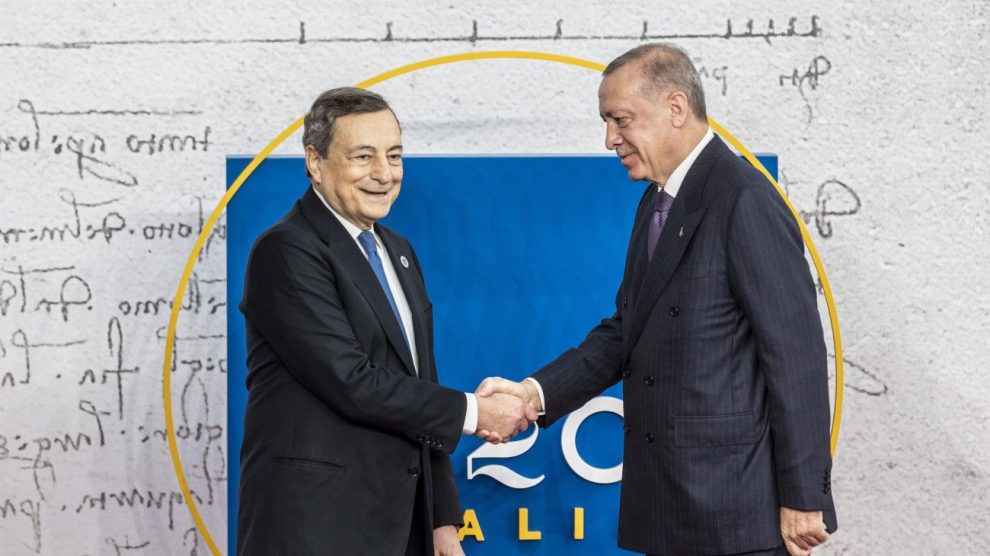The Ankara summit. On Tuesday, Italian Prime Minister Mario Draghi landed in Ankara to meet with Turkish President Recep Tayyip Erdogan. The duo are slated to partake in an intergovernmental summit session, sign agreements and hold a joint press agreement.
- Along with PM Draghi, a team of key Italian ministers will meet their Turkish counterparts. The formers are Luigi Di Maio (Foreign Affairs), Luciana Lamorgese (Internal Affairs), Lorenzo Guerini (Defence), Giancarlo Giorgetti (Economic Development) and Roberto Cingolani (Ecological Transition).
Warming up to each other. It’s the first time in a decade a sitting Italian PM travels to Turkey for an official visit. The summit hints at Ankara and Rome’s willingness to improve their relationship – which had been frosty not too long ago.
- In April 2021, Mr Draghi famously called Mr Erdogan a “dictator” which “we nonetheless must speak to,” sparking diplomatic backlash. But the two have spoken repeatedly since then, and they held their first bilateral meeting in March 2022 alongside the NATO summit.
It’s not just Italy. Zooming out, Mr Erdogan’s assertiveness on some issues over the past years often angered its allies. The latest episode entailed him throwing a wrench into Finland and Sweden’s NATO accession process. Nevertheless, Turkey’s geopolitical weight is unquestionable, which is part of the reason behind this deeper Italian, European and Western engagement.
It’s all about diplomacy – and realpolitik. Alessandro Politi, Director of the NATO Defense College Foundation, believes that the importance of dialogue is the overarching theme behind Mr Draghi’s visit.
- “Talking to everyone does not mean agreeing with everyone or agreeing on everything, but it does mean understanding that there are several regional players that have objectively grown in importance,” he told our sister site Formiche.net.
- “[Mr] Erdogan is an important player, a regional player, both because of geography and his political activity. So [Mr] Draghi’s meeting is a concrete meeting, with all the hardships that come with it.”
- On his part, the Turkish president is also throwing his weight around – as he does – to tackle his country’s deep economic hardships, he argues. Surely new agreements with Italy cannot hurt this effort.
Some key issues over which Ankara and Rome don’t always see eye to eye but must cooperate include the Libyan crisis, Russia, and energy.
- The latter dossier has repeatedly sparked tensions over drilling rights in the Eastern Mediterranean. And although freezing the EastMed gas pipeline project can surely appease Mr Erdogan, Mr Politi believes the pressing need to diversify suppliers will bring all partners to compromise.
About the NATO accession saga – which sees Mr Erdogan grappling with the decades-old Kurdish issue and his electorate along with Turkey’s weight in the Alliance –, the expert hopes for an internal “process of political maturation” that could bring Ankara to consider a different solution to the issue – not unlike how London is dealing with the Northern Ireland issue.
However, it’s not only about the Kurds: Mr Politi believes it also has to do with the Alliance’s internal arrangements.
- “Firstly,” he argued, “there’s [Turkey’s] relationship with the United States, which needs to be recovered: you grease the squeaky wheel, not the quiet one.”
- “Secondly, the relationship between North and South of the Alliance. And here the Turks have a silent but very concrete awareness; otherwise, what would they be doing in the Balkans?”
- “Thirdly, the relationship with the other Black Sea powers, namely Kyiv and Moscow. The arrival of [Finland and Sweden] complicates these relations, if only from a purely national perspective. So [Mr] Erdogan, as it were, sold the postponement of his veto to the time of ratification,” he concluded, calling this a result of “the diplomatic success of the Secretary General’s and NATO allies’ mediation efforts in favour of the governments in Helsinki and Stockholm.”




